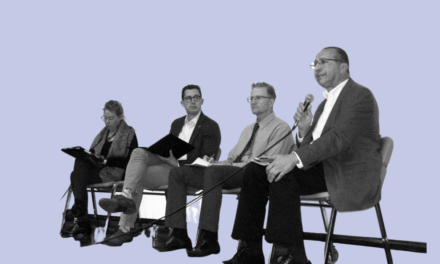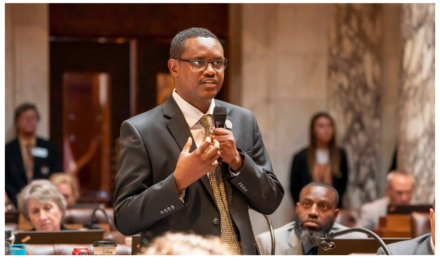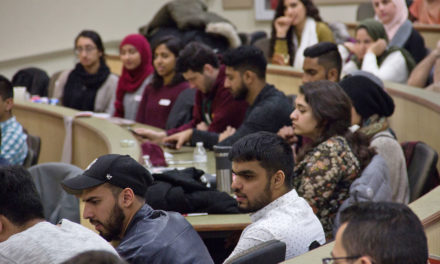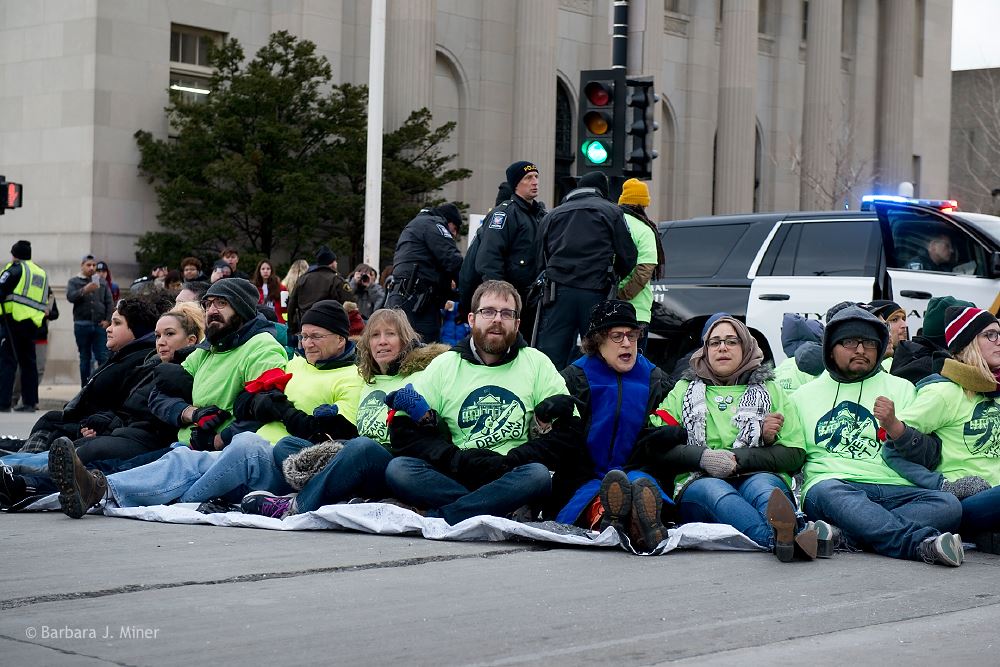
“Who are the folks who understand the struggles of being a working-class citizen or the life struggles related to housing and work conditions? Ryan gets the narratives of the folks directly impacted.” He engages at the community level to develop solutions with people who understand the issues, said Madison.
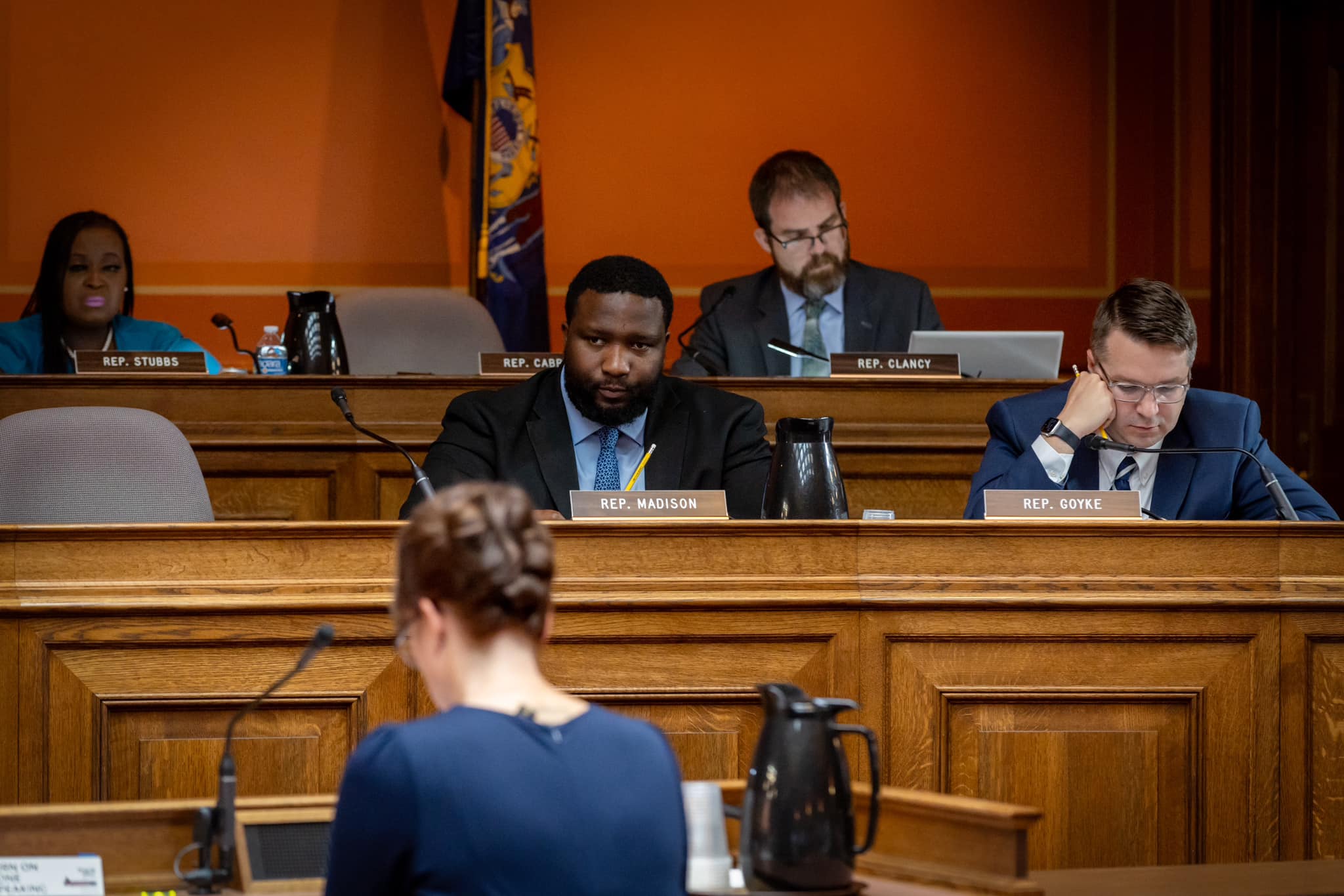
Rep. Darrin Madison (District 10) and Rep. Ryan Clancy (District 19) were sworn in during the 2023-2024 Wisconsin State Assembly Legislative Session.
Clancy is “an unflagging champion for poor and working people … and a true friend and supporter of public schools, criminal justice reform and union rights,” wrote Frank Shansky in an invitation to a Progressive fundraiser for Clancy held last Monday.
Wisconsin Muslim Civic Alliance recently announced its endorsement of Clancy, 47, of Bay View to be re-elected to the Wisconsin Assembly to represent District 19. It includes downtown Milwaukee and much of Milwaukee’s Lake Michigan coastline, including Bay View, the East Side and Riverwest. One reason—his consistent engagement with Wisconsin’s Muslim community, said WMCA executive director Fauzia Qureshi. Another reason—the values he shares with WMCA, she said.
The Aug. 13 Democratic primary will determine who will represent the heavily Democratic district for the next two-year term since no Republican is in the race. Clancy and his supporters expect a tough fight largely due to his strong stand against the slaughter of Palestinian civilians in Gaza.
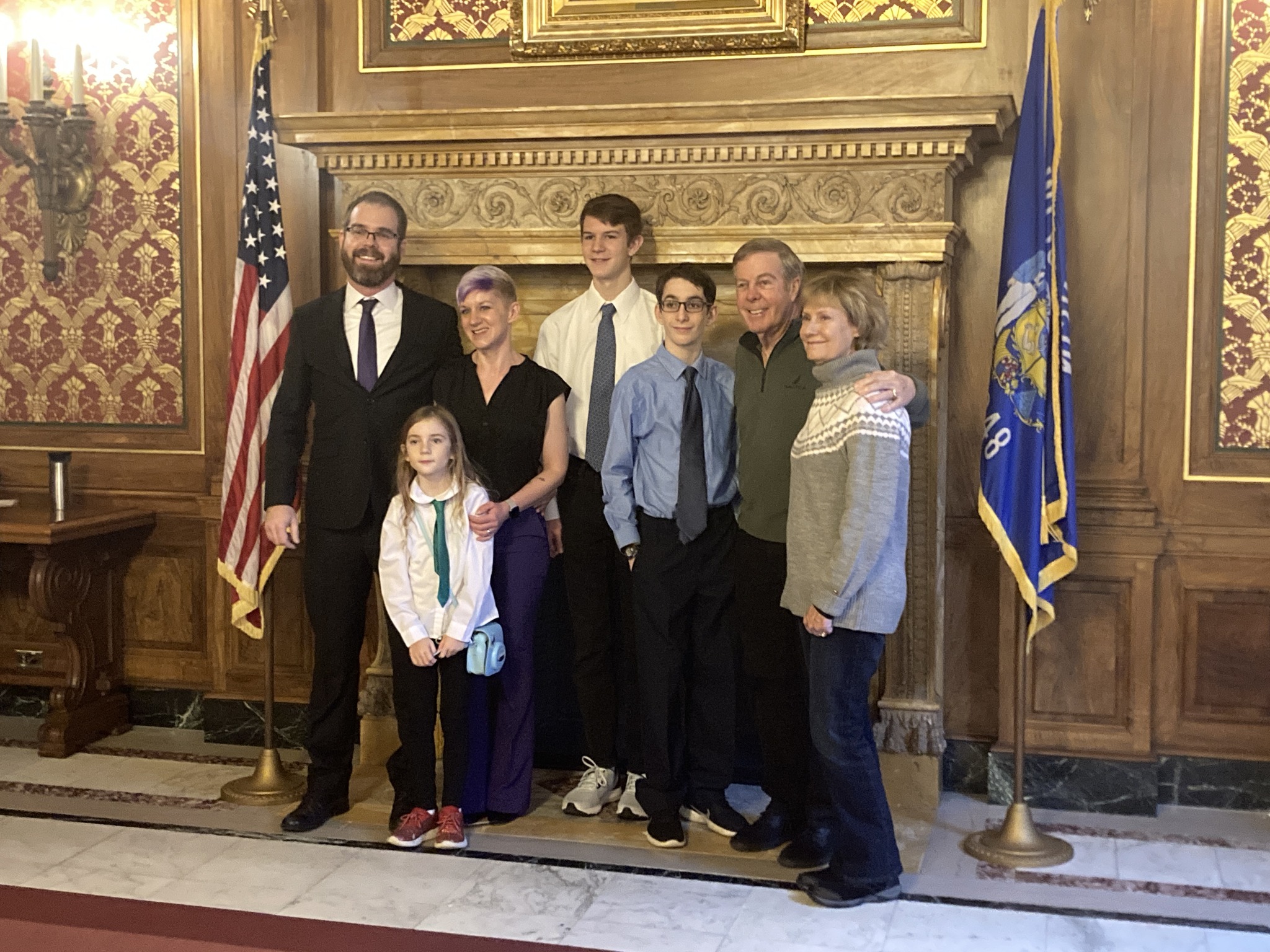
Rep. Ryan Clancy with some of his family at his swearing-in ceremony to the 2023-2024 Legislative Session of the Wisconsin State Assembly.
Clancy’s bottom-up politics
New York Times columnist David Brooks calls bottom-up politics “a localist revolution.” It empowers members of a community to pursue problem-solving together.
The Urban Sustainability Laboratory at the Wilson Center, a non-partisan think tank chartered by the U.S. Congress, defines bottom-up politics as “processes and practices of local problem solving in which communities gather evidence, build coalitions, display creativity and often increase their efforts in scale and breadth.” Partisan gridlock and protracted inattention to everyday problems citizens face are spurring its growth, it says.
Engaging with the local community is how Clancy operates, according to Madison, Clancy’s wife Becky Cooper and others.
“Ryan goes out of his way to talk to people whose family members are incarcerated, to people who feel they don’t have access to politicians, who may not be able to attend fundraisers in the same ways as others,” Cooper told WMJ. “He listens to them and really hears what they need.”
He uses their input to take action.
“In his four years on the County Board, Clancy authored and passed 26 pieces of groundbreaking legislation, including the Right to Shelter, which funded outreach services to homeless persons, the Right to Counsel, which provides legal assistance to tenants facing eviction and prevents homelessness, paid family leave for County employees and an abortion travel fund for County staff,” Shansky noted. He “also opposed last year’s regressive sales tax increase at the city and county level.”
“At the State, the gerrymandered legislature prevents Democrats’ bills from being heard but that hasn’t stopped Ryan from doing the work,” Shansky wrote. “He already has 56 pieces of legislation written and jacketed, ready to be heard … These bills tackle everything from taking Right to Counsel statewide to major criminal justice reforms and education funding.”
PrincessSafiya Byers of Milwaukee Neighborhood News Service said Clancy brought “advocacy and activism” to his work on Milwaukee County Board of Supervisors, where he represented the 4th District from April 2020-April 2024. She described him as a fighter and quoted him saying, “There is a major gap between what the public wants and how their representatives are voting.”
Clancy aims to close that gap, he said in an interview in June with WMJ.
Shared values and engagement
WMCA announced its endorsement of Clancy June 26. His commitment to listening to local communities, particularly the Muslim community, was a key factor that led to his endorsement, WMCA executive director Fauzia Qureshi said in an interview this week.

“He has consistently demonstrated his commitment to engaging with Muslim individuals and Muslim organizations, both within his district and in the broader community,” Qureshi said. “He has decades of experience, beginning with peace and reconciliation work on the ground in predominantly Muslim countries.
“He proudly displays WMCA’s endorsement on his campaign website and social media,” Qureshi added. “Some candidates like to get our endorsement but then do not publicly announce they received it on their own social media.
“Our endorsement is also based on his policy positions, effectiveness and alignment with the needs and values of Wisconsin’s Muslim community,” she said. He advocated for anti-Islamophobia training for public employees, including law enforcement. He also supports affordable healthcare for all lawfully present immigrants.
“He strongly supports state grants and low interest loans for minority-owned small businesses, accommodations for religious practices in public schools and by employers, affordable healthcare and reproductive healthcare for all lawfully present immigrants,” she continued.
“I personally think he is a great individual,” Qureshi added. “He’s always been very supportive of everyone living in the greater community.”
In his own words
Tall and lanky, with a neat brown beard and mustache, dressed in jeans and a tee-shirt, Clancy seemed at home at the sidewalk table at Colectivo Coffee in Bay View, in the heart of District 19, which Clancy represents and where he is campaigning for re-election.
He spent an hour with a WMJ reporter, discussing his background, values and his goals.
Born in Milwaukee to an Irish Catholic family, he has lived most of his life in Greater Milwaukee. His father is one of nine children; he grew up with his parents and younger brother. Clancy and his wife Becky Cooper have five children, ranging in age from 10 to 25.
He earned a bachelor’s degree in English and education, with a minor in journalism, from Beloit College, then joined the Peace Corps. (He later earned a master’s degree in Negotiation, Conflict Resolution and Peacebuilding from California State University and did field work in Israel and the Palestinian Territories.)
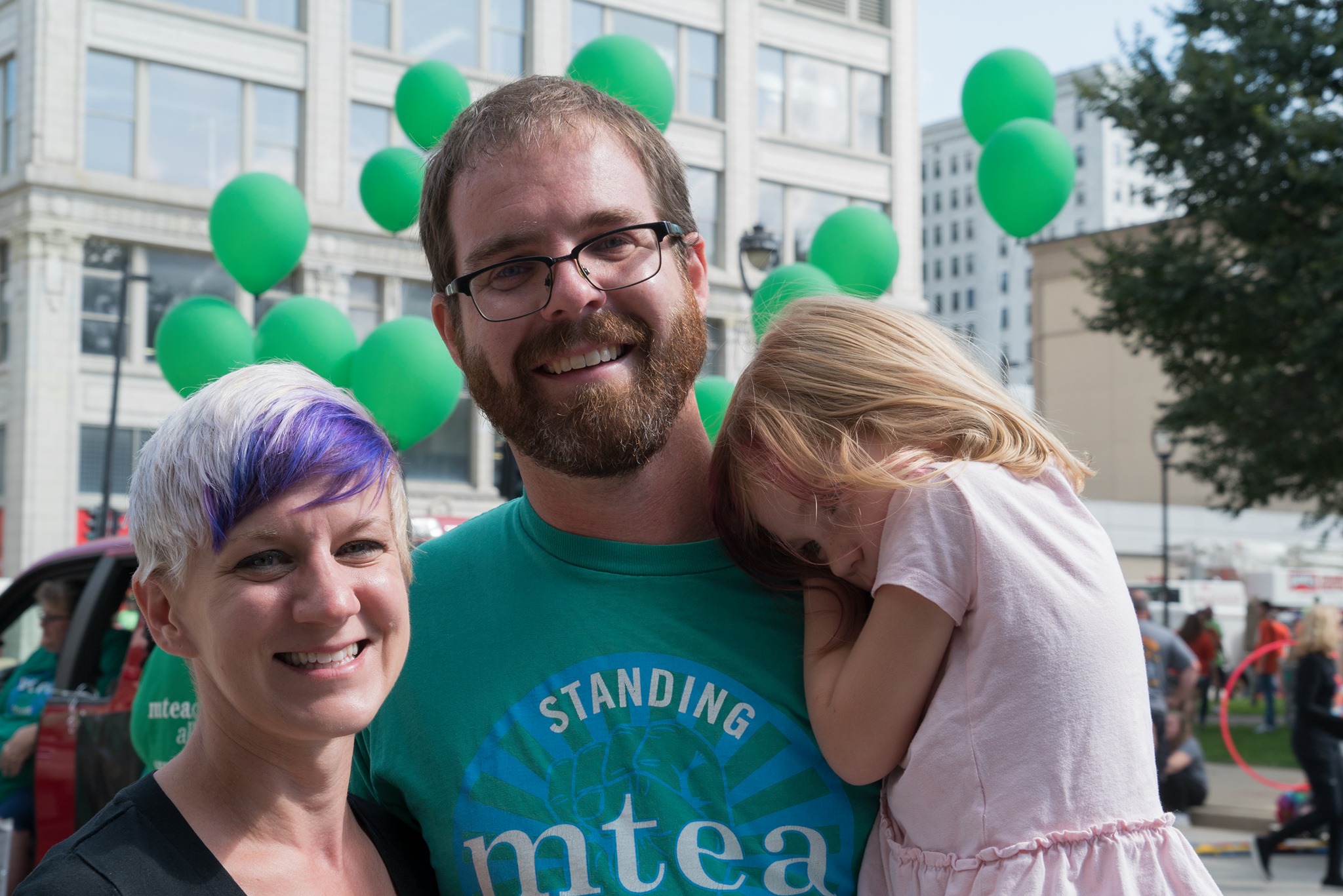
Rep. Ryan Clancy and his wife Becky Cooper with their daughter Fiona
Clancy has a history of political activism that includes being a “human shield” in Iraq during the 2003 U.S. invasions and advocating for Palestinian rights.
How does one become a “human shield” in Iraq?
Clancy, in his early 20s, was watching CNN in 2003 “in the run up to the Iraq war. It was laughably embarrassing stuff like stock terrorist training footage,” he recalled. “The implication was that people in Iraq were all terrorists. I had the general sense that wasn’t the case, that there were people over there very much like us.”
He heard about “the human shield movement” that was leaving from London. “The idea was to wind through Europe, pick up some more people and eventually have a critical mass of western folk in Iraq with the hope to avert a war and to keep a lot of civilian infrastructure from being targeted.” Clancy bought a one-way ticket to Italy, where he joined the group.
“It was a transformative experience in terms of learning how activism and organizing works,” he said. “I wanted to stop the war. It was clearly not a just war and as an American, I have a duty to intervene.”
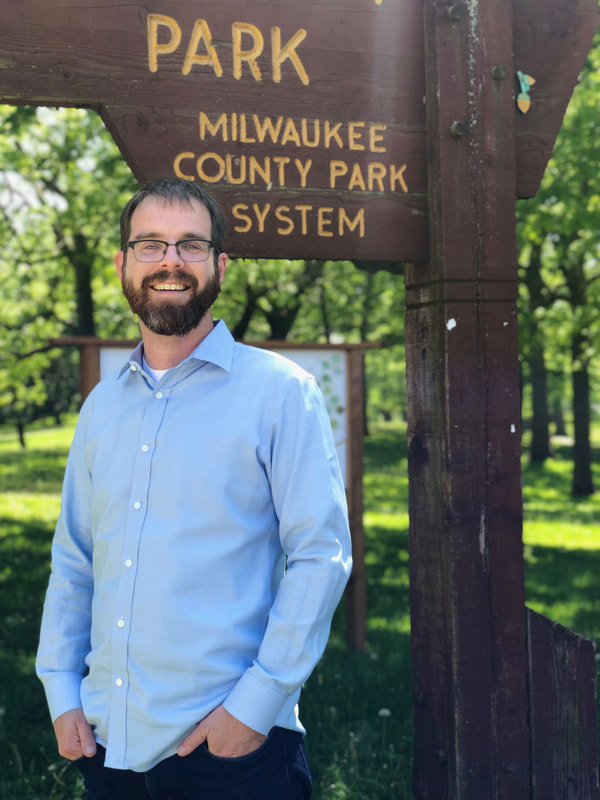
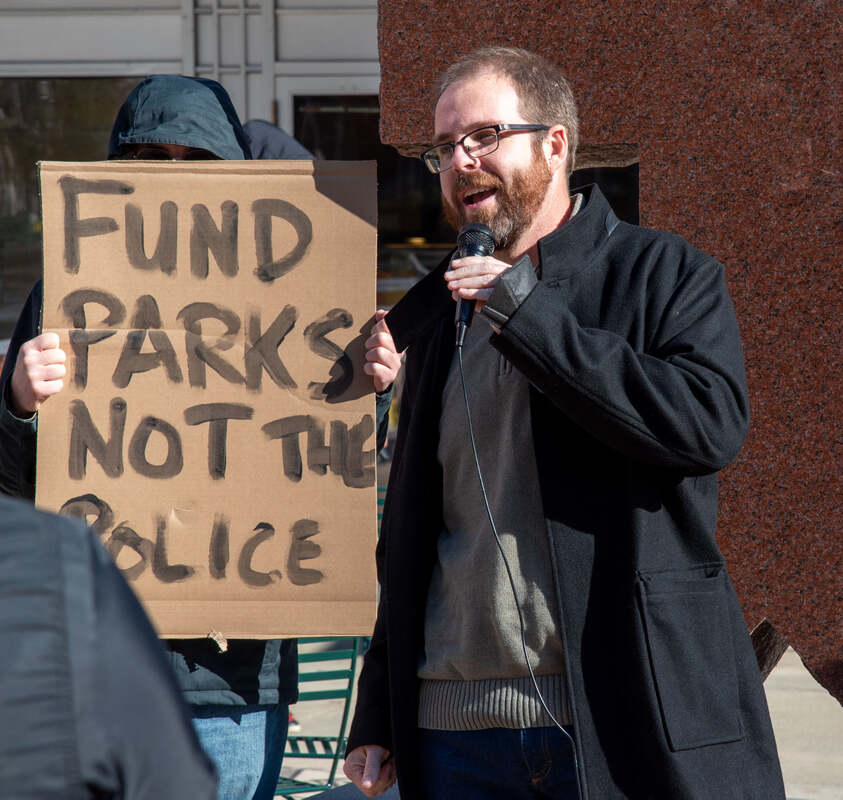
A substitute teacher in Milwaukee before he left for Iraq, Clancy’s strategy was to humanize the Iraqis to his fellow Americans back home. “In the U.S., we don’t understand how much we have in common with families there. It was so disturbing to me to see an entire culture of people portrayed as terrorists,” he explained. He took crayons and paper with him and asked the children of Iraq to draw pictures of their home and families.
One child drew her house. “It looked like a normal house you’d find here,” he said, “but with a missile aimed at the house with an American flag on it. That still moves me. It wasn’t a political statement. She didn’t even seem disturbed by it. She handed it to me with a smile on her face. That’s why it hit me so hard. This elementary school-aged kid had internalized the idea of American violence on her home.”
He asked high school students to write letters to their American counterparts. Many of them echoed the sentiment, “We like you. Why don’t you like us?” That hit hard, too, he said.
“Unfortunately, America’s policy suggests we have hatred for folks in the Middle East and I know many individual Americans do not. They don’t share the hatred some of our policies reflect.
“Looking back on the Iraq War now, I think just about everybody, with the exception of those on the far right, think we should not have done what we did. The cost was really terrible. But at the time, I received one of my first death threats.”
From a hospital in Jordan, where Clancy was being treated for infection, “I watched on TV as the people I had met were killed by my government. Then I was prosecuted for having violated the sanctions by going to Iraq. They threatened me with 10 years in jail and a million-dollar fine.”
The American Civil Liberties Union represented Clancy and he ended up settling with an $8,000 fine.
It was the second time the ACLU had defended him. The first was as a high school student when he and some friends created a newspaper that ran into conflict with the Nicolet High School administration. It threatened to expel Clancy and some other students, he said. “The high school was not embracing dissent.”
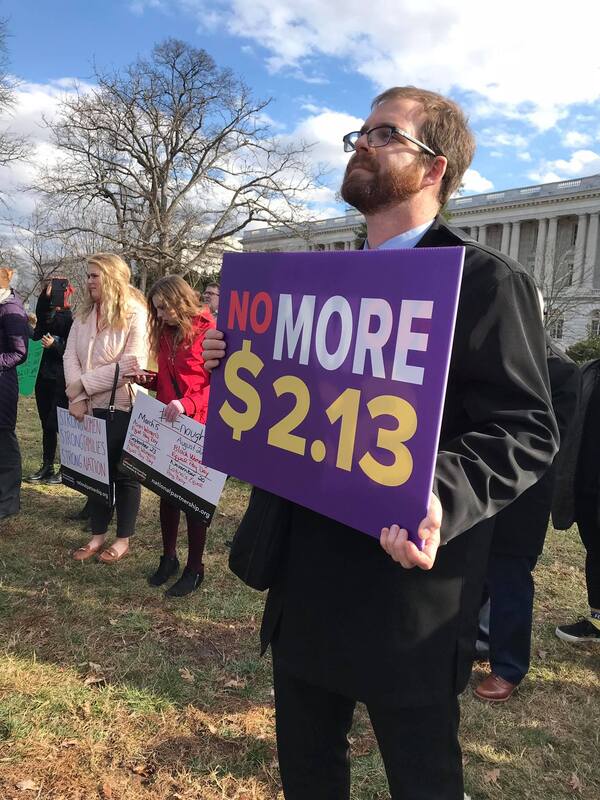
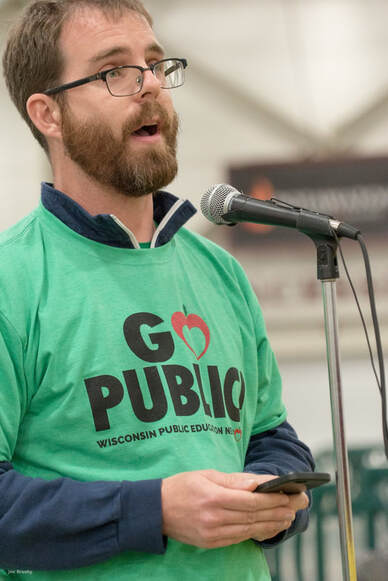
Photo by Joe Brusky
A former Milwaukee Public School teacher and Milwaukee Teachers Education Association building representative, Rep. Ryan Clancy supports strengthening public education.
With the newspaper, Clancy pulled together students from different social groups and cliques to work together. “I think this was my first organizing success,” he said. “I discovered you can form coalitions out of people who have at least one issue in common and do a lot of good work. It laid the groundwork for a lot of stuff I would do later.
“I didn’t have any political aspirations until well into my thirties,” Clancy said. “I had written off the idea that anybody in elected office would do anything of substance. They seemed unable or unwilling to affect change in the way I knew we needed it. Now that I’m part of the system, I am still butting heads against it all the time,” he said.
What does Clancy want to do?
“Education’s a big one. Also, the issue of mass incarceration and the awful conditions in our jails and prisons is one that is very motivating to me. It’s shameful what those conditions look like. It’s been a big struggle to make those conditions better.
“We don’t get safer by over-policing and over-incarcerating people. The data doesn’t support that. We need to be willing to have longer conversations about what actual public safety means.”
The way to solve the problems with crime, education, war—every issue—is to talk with people from the community and work together, Clancy said. He encourages people who never engage in the political process to speak out, attend meetings and write letters. As Cooper put it, “He empowers them.”
“I want to advocate for people who are not conventionally powerful,“ Clancy said.
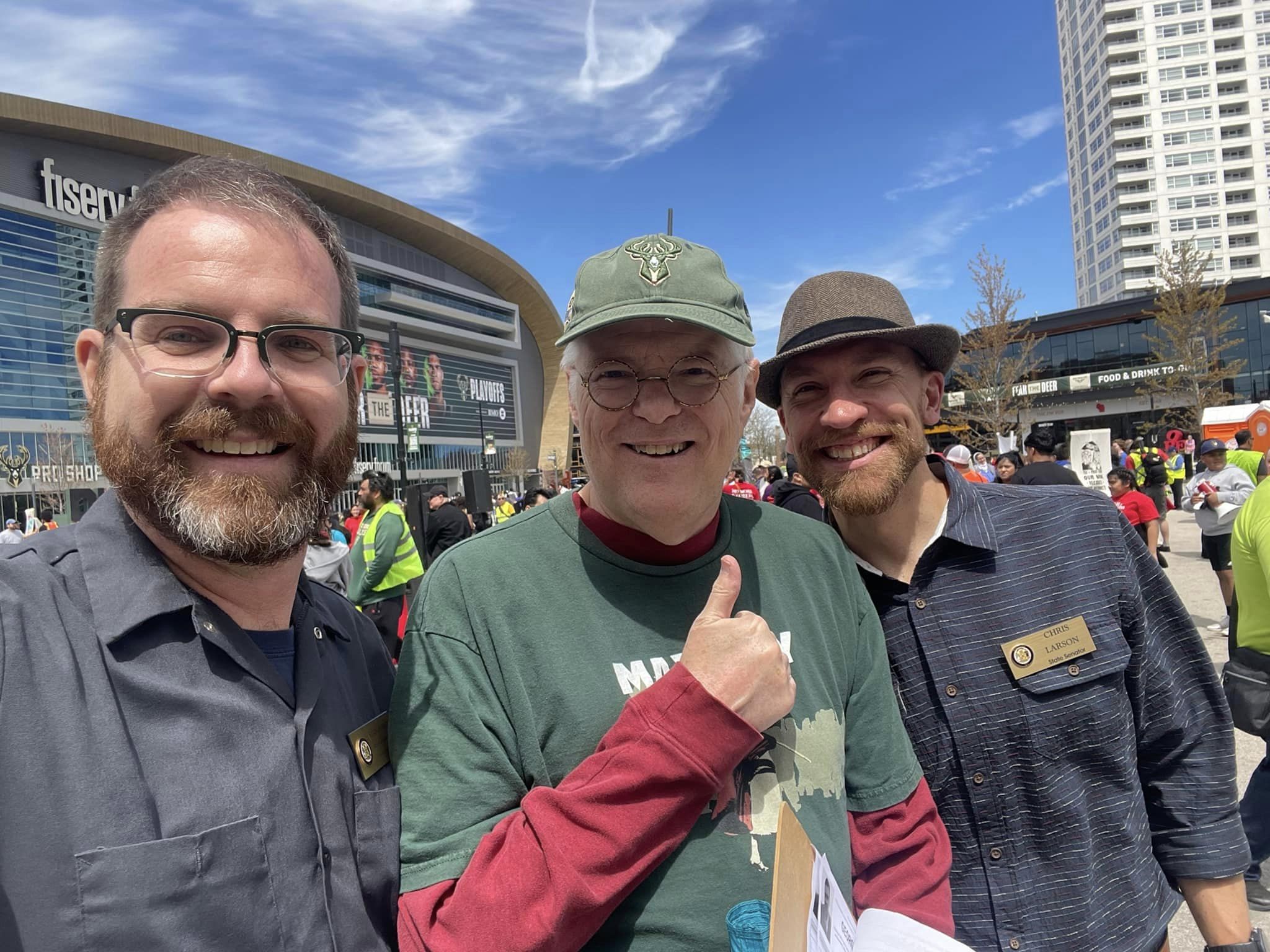
Left to right, Rep. Ryan Clancy (District 19), Rep. Steve Shea (District 8) and State Senator Chris Larson attend the Voces de la Frontera May Day March.

